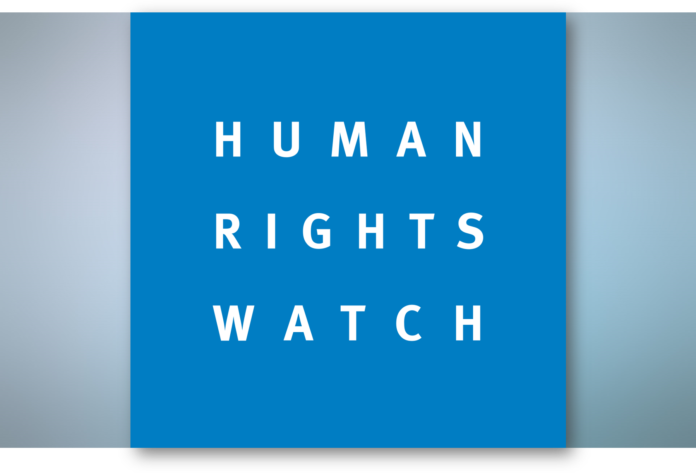The Human Rights Watch (HRW) World Report 2025 has documented extensive human rights abuses in Turkey, including continued crackdowns on alleged members of the Gülen movement in 2024.
HRW’s World Report 2025 provides a comprehensive overview of human rights conditions in over 100 countries, examining key developments from the past year. In its Turkey section, the report highlights systemic abuses against alleged members of the Gülen movement, nearly a decade after Turkish authorities accused it of orchestrating a coup attempt on July 15, 2016.
President Recep Tayyip Erdoğan has been targeting followers of the Gülen movement, inspired by the late Turkish cleric Fethullah Gülen who passed away in exile in October, since corruption investigations revealed in December 2013 implicated then-prime minister Erdoğan as well as some members of his family and inner circle.
Dismissing the investigations as a Gülenist coup and a conspiracy against his government, Erdoğan designated the movement a terrorist organization and began to target its members. He intensified the crackdown on the movement following an abortive putsch in 2016 that he accused Gülen of masterminding. The movement strongly denies involvement in the coup attempt or any terrorist activity.
Following the failed coup, the Turkish government carried out a massive purge of state institutions under the pretext of an anti-coup fight. More than 130,000 public servants, including in excess of 4,000 judges and prosecutors, as well as more than 24,000 members of the armed forces were summarily removed from their jobs for alleged membership in or relationships with “terrorist organizations” by emergency decree-laws subject to neither judicial nor parliamentary scrutiny.
In the report, HRW criticized the Turkish government for what it described as “prolonged and arbitrary imprisonment” and the absence of effective remedies for those impacted by the mass dismissals from public service.
According to a statement from the Turkish justice minister, a total of 705,172 people have been investigated on terrorism-related charges due to alleged links to the Gülen movement since the failed coup. As of July 2024, there were 13,251 people in prison who were in pretrial detention or convicted of terrorism in Gülen-linked trials.
The report also highlighted Turkey’s failure to act on a binding European Court of Human Rights (ECtHR) judgment in the case of former teacher Yüksel Yalçınkaya.
In September 2023, the Strasbourg court delivered a landmark judgment faulting Turkey over the conviction of former teacher Yüksel Yalçınkaya due to his alleged links to the Gülen movement, which was demonstrated through his labor union membership, banking transactions and use of the ByLock messaging application. The report noted that the court found there had been an arbitrary application of the law that violated the principle of legality. The judgment also found violations of fair trial and freedom of association rights and ruled that Turkey needed to implement general measures to address the violations.
ByLock, once widely available online, has been portrayed as a secret tool of communication among supporters of the faith-based Gülen movement since the coup attempt on July 15, 2016, despite the lack of any evidence that ByLock messages were related to the abortive putsch.
Nonetheless, a Turkish court convicted him once again in September 2024 on the same charges. HRW noted that thousands of similar cases are pending before the ECtHR.
The report also included findings from the United Nations Committee Against Torture that raised concerns about the treatment of individuals in detention, including those with affiliations with the Gülen movement. Practices such as reverse handcuffing, solitary confinement and extrajudicial renditions were flagged, with HRW calling for systemic reforms.
While the Gülen movement faced targeted repression, HRW also documented broader infringements on freedoms in Turkey under the government of President Erdoğan and his Justice and Development Party (AKP).
The report detailed increasing restrictions on media freedom, noting that at least 21 journalists and media workers were either in pretrial detention or serving prison sentences under Turkey’s Anti-Terror Law. Kurdish journalists, in particular, faced disproportionate prosecution, with eight convicted in July 2024 on terrorism charges and an additional trial involving 20 Kurdish media workers still ongoing at the time.
Freedom of expression remained under assault, with authorities regularly blocking websites, social media platforms and critical news coverage. The report highlighted an August incident in which Turkish officials blocked Instagram for eight days without specific justification, following a controversy involving condolence messages related to the late Hamas leader Ismail Haniyeh.
HRW also highlighted abuses against Kurdish activists, human rights defenders and opposition politicians, pointing to widespread bans on protests and assemblies. Thousands of Kurdish activists and officials remain imprisoned on what HRW described as terrorism charges for non-violent political activities.
Other sections of the report detailed ongoing xenophobic violence against refugees, with Syrians in particular facing hostility and unlawful deportations, and a sharp rise in anti-LGBT rhetoric and restrictions, including the continued ban on İstanbul Pride events for the tenth consecutive year.
The report emphasized Turkey’s challenges with judicial independence, political polarization and systemic human rights failures, urging the government to address its obligations under international law.















